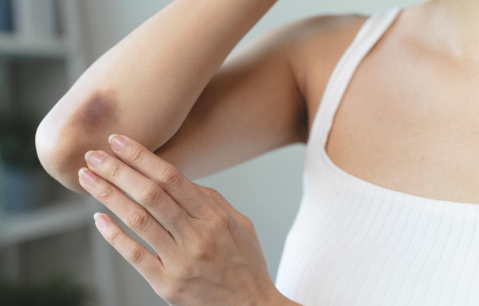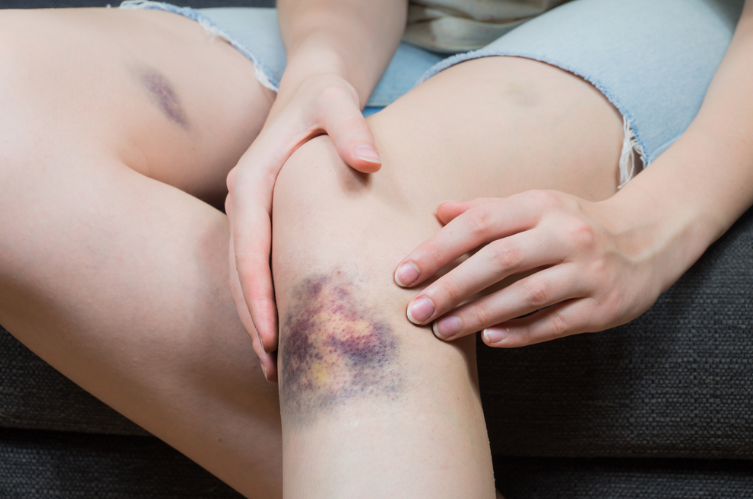Have you ever woken up with a strange bruise you can’t explain?
One minute, you’re living your life as usual, and the next—bam!—there’s a mysterious black-and-blue mark on your arm or leg. Maybe you brushed against a table edge, or maybe… you don’t remember anything at all.

While most bruises are harmless, they can sometimes be a red flag.
Your body could be signaling an underlying issue, especially if you’re bruising more easily than usual. Let’s dig into what bruises really mean—and when they deserve a second look.
What Is a Bruise, Exactly?

A bruise, or ecchymosis, happens when tiny blood vessels (capillaries) under your skin break from an impact, causing blood to leak and pool. This trapped blood forms the visible discoloration we know as a bruise.
It starts red or purple, then turns green or yellow as it heals—like nature’s weird little time-lapse.
Most bruises result from minor injuries, but if you’re bruising easily or often, there might be something else going on.
When Should You Be Concerned About Bruising?
Occasional bruises are normal. But see a doctor if you notice:
Bruises without clear reason
Slow healing (more than 2 weeks)
Bruises in unusual areas (stomach, back, ears, genitals)
Bruising with other symptoms (fatigue, bleeding gums, etc.)
Surprising Cause: Vitamin Deficiencies
Certain nutrients keep your blood vessels and skin strong. Without them, you’re more likely to bruise.
Vitamin C
Essential for collagen and blood vessel health. A deficiency can cause fragile capillaries that burst easily.
Sources: Oranges, bell peppers, strawberries, broccoli.
Smokers and stressed individuals are more prone to Vitamin C deficiency.
Vitamin K
Vital for blood clotting. If you’re low on K, small injuries may cause larger bruises.
Sources: Leafy greens like kale, spinach, and broccoli.

Vitamin D & B Vitamins
Vitamin D helps maintain healthy skin, while B12 and folate support blood production. Low levels can also contribute to bruising.
Tip: A routine blood panel can help you spot deficiencies early.
Supplements That Increase Bruising Risk
Certain supplements can thin your blood, making bruising more likely—especially when combined with medications:
Ginkgo biloba
Ginseng
Garlic
Ginger
Omega-3s (fish oil)
Vitamin E
Turmeric
Saw Palmetto
Always inform your doctor about any supplements you’re taking.
Other Common Bruising Triggers
Medications: Blood thinners, aspirin, NSAIDs, steroids, some antibiotics
Aging: Skin thins, and blood vessels become fragile
Sun Damage: Long-term UV exposure weakens skin over time
Medical Conditions: Diabetes, anemia, hemophilia, leukemia, or liver disease
Sports & Exercise: Heavy lifting or impact sports can leave you sore and bruised
How to Treat Bruises at Home
Use the R.I.C.E. method:
Rest the bruised area
Ice it (20 mins at a time)
Compress with a soft bandage if swollen
Elevate to reduce blood flow and swelling
After 48 hours, apply a warm compress to improve circulation. Acetaminophen can ease discomfort—avoid aspirin or ibuprofen if you’re already bruising easily.
How to Prevent Bruising
Eat a nutrient-rich diet (especially Vitamins C, K, and D)
Exercise safely and warm up properly
Check medications/supplements for blood-thinning effects
Fall-proof your home with good lighting, no-slip rugs, and tidy walkways
When to Talk to Your Doctor
Get checked out if your bruises:
Appear often and without cause
Take weeks to heal
Are accompanied by bleeding gums, fatigue, or nosebleeds
Are large, painful, or swollen
Early diagnosis can uncover hidden conditions—and sometimes even save lives.
Final Thoughts
Most bruises are no big deal—but don’t ignore your body’s signals. Frequent, painful, or unexplained bruises might mean it’s time to look deeper. Whether it’s a simple vitamin fix or a more serious issue, awareness is your best defense.
Listen to your skin—it might be trying to tell you something.
